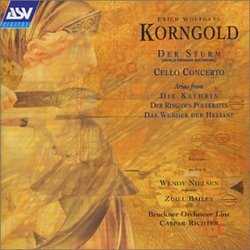| All Artists: Korngold, Neilsen, Bailey, Pazmany, Richter Title: Der Sturm / Cello Concerto / Much Ado About Nothin Members Wishing: 0 Total Copies: 0 Label: Asv Living Era Release Date: 10/21/2003 Genre: Classical Styles: Opera & Classical Vocal, Ballets & Dances, Ballets, Forms & Genres, Concertos, Historical Periods, Modern, 20th, & 21st Century, Instruments, Strings, Symphonies Number of Discs: 1 SwapaCD Credits: 1 UPC: 743625114621 |
Search - Korngold, Neilsen, Bailey :: Der Sturm / Cello Concerto / Much Ado About Nothin
 | Korngold, Neilsen, Bailey Der Sturm / Cello Concerto / Much Ado About Nothin Genre: Classical
Erich Wolfgang Korngold was born in Vienna in 1897, son of the feared, powerful music critic Julius Korngold, and he died in Hollywood in 1957. A sensational child prodigy, he composed his first ballet under Zemlinsky's tu... more » |
Larger Image |
CD Details
Synopsis
Amazon.com
Erich Wolfgang Korngold was born in Vienna in 1897, son of the feared, powerful music critic Julius Korngold, and he died in Hollywood in 1957. A sensational child prodigy, he composed his first ballet under Zemlinsky's tutelage at age 11, and four years later had written an opera, choral, orchestral and chamber music. A major career seemed assured but was aborted by Hitler; fortunately, Korngold was already in Hollywood, where he became one of the best and most successful film composers. However, he yearned to write "serious" music, but found himself forgotten, passé, and out of step with contemporary trends. Worse, the frustration seems to have sapped his creative inspiration: he never produced another truly original work, falling back on his film material for his concert compositions. With one exception, this record focuses on his European works, some never performed or recorded before, and it is clear that though he was steeped in the music of his time, his style already carried the seeds that blossomed so luxuriously in his film scores: the rich, super-romantic harmonies, surprising modulations, arching melodies, and the incredibly lush, colorful orchestration (Zemlinsky, who himself died in America poor and neglected, must have been a fabulous teacher). However, young Korngold must have learned the sensuous, ecstatic rapture of the three soprano arias here (unfortunately sung with a wide wobble) from the decadent air of early 20th-century Vienna itself. The earliest piece is a charming waltz (1908-09); it echoes both Johann and Richard Strauss but is spiked with cross-rhythms. The Storm for chorus, on texts by Heine (1913), graphically evokes a tempest with jagged vocal leaps, trumpets, drums, shrilling flutes, then soars into lyrical serenity. Three orchestral stage music excerpts (1918-19) are lovely. The only American piece is the Cello Concerto (1946), taken from the film Deception and expanded into a full-length movement. It has all the ingredients of a major concerto: introduced by chords fluctuating between C major and C minor, two themes, one sweeping and passionate, the other beautifully lyrical, are skillfully developed; a deeply felt, mournful slow section ends in a flute and cello cadenza with shimmering harp glissandi. The finale is light and bouncy, ending with long scales on the cello and loud crashes from the orchestra. Zuill Bailey sounds a bit distant at times, but plays the extremely difficult solo part brilliantly, with total emotional commitment. Korngold reportedly planned to add two more movements, but he never did: another opportunity lost to fame and fortune, or fate and misfortune? --Edith Eisler

 Track Listings (12) - Disc #1
Track Listings (12) - Disc #1